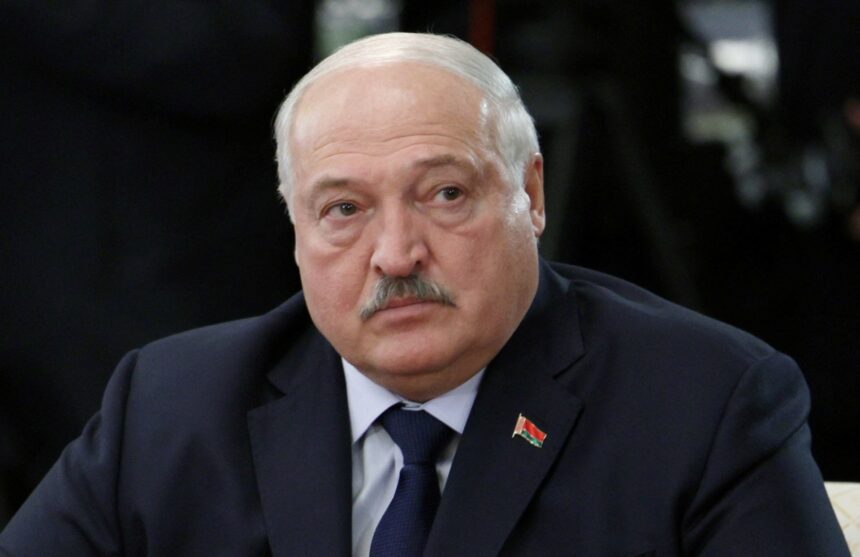The citizens of Belarus are currently participating in a presidential election on Sunday as President Alexander Lukashenko seeks a seventh term in office.
For the past three decades, Lukashenko, who is 70 years old, has been in power with an iron grip, suppressing any opposition or dissenting voices.
The president, who did not actively campaign for this election, told workers at a factory last week, “To be honest, I am not following the campaign. I simply do not have the time for it.”
In the previous election in 2020, which was marred by allegations of widespread fraud, mass protests broke out after Lukashenko was declared the winner. The opposition and Western countries claimed that the election was rigged and that the true winner was Sviatlana Tsikhanouskaya, who was forced to flee the country.
With his political opponents either imprisoned or in exile, Lukashenko’s victory on Sunday is widely expected.
The election was originally scheduled for August but was postponed to the middle of winter. Belarusian political analyst Valery Karbalevich suggested that this was done so that there would not be large protests in the freezing cold of January.
Here is what you need to know about the election:
When do ballots open?
Polls opened across the country at 8am (05:00 GMT) and will remain open until 8pm (17:00 GMT).
Belarus follows a simple majority system, where citizens vote for the president and legislature every five years.
Belarusians who are 18 years and older are eligible to vote.
The results are expected by February 5, and if needed, a second round will be held on February 12.
How many people are expected to vote?
State news agency BelTA reported that after three days of early voting, the turnout was 27.15 percent.
In a December opinion poll of 1,500 people, 85.5 percent of registered voters indicated they would vote in the upcoming election.
Approximately 84 percent of eligible voters cast their ballots in the August 2020 presidential election, according to Statistica.
Overseas Belarusians can only vote in the election by returning to the country and casting their ballot at a regional polling station.
Who is running against Lukashenko?
According to the Central Election Commission (CEC) of the country, four candidates have been registered to run.
Oleg Gaidukevich, chairman of the Liberal Democrats, announced his candidacy in October, stating that there should be “healthy competition and discussion.”
Sergei Sirankov, the first secretary of the Communist Party’s Central Committee, is also on the ballot.
Anna Kanapatskaya, a former member of parliament who ran in the 2020 presidential election, is also a candidate, along with Alexander Khizhnyak, chairman of the Republican Labour Party.
However, Tatsiana Chulitskaya, a Belarusian academic at Vilnius University in Lithuania, noted that none of the candidates criticized Lukashenko during their campaigns.
What happened in 2020?
Following the August election, the CEC announced that Lukashenko had been re-elected with 80.1 percent of the vote, defeating Tsikhanouskaya.
Allegations of voter fraud quickly spread, with some arguing that the counts from polling stations did not match the official count by the CEC, leading to accusations of election theft by opposition groups and Western governments.
Peaceful protests erupted in Minsk demanding Lukashenko’s resignation due to the election results.
However, protesters were met with a harsh crackdown by the police, resulting in mass arrests. The Belarusian human rights group Viasna reported that more than 3,270 people have been convicted for participating in the 2020 protests.
The group also found that there are over 1,200 political prisoners in the country. Last week, Lukashenko released 23 political prisoners in what state media described as a humanitarian gesture, possibly timed ahead of the election.
Has the election received any backlash?
Tsikhanouskaya called on Western countries to reject the “illegitimate” election.
She stated to BBC News that the election is a “sham” and a “military-style operation staged by the regime to retain power.”
She urged Belarusians not to protest as they did in the last election, advising them to stay safe until a real opportunity arises.
Recently, the European Parliament passed a resolution rejecting the election results.
The European Parliament expressed its unwavering support for the Belarusian people in their quest for democracy, freedom, and human rights, while reiterating their non-recognition of Lukashenko as President and deeming the entire Belarusian regime illegitimate.
Former US Secretary of State Antony Blinken condemned the Belarusian government’s efforts to legitimize the election, stating that the elections could not be considered free or fair in an environment where censorship is pervasive and independent media outlets no longer exist.








